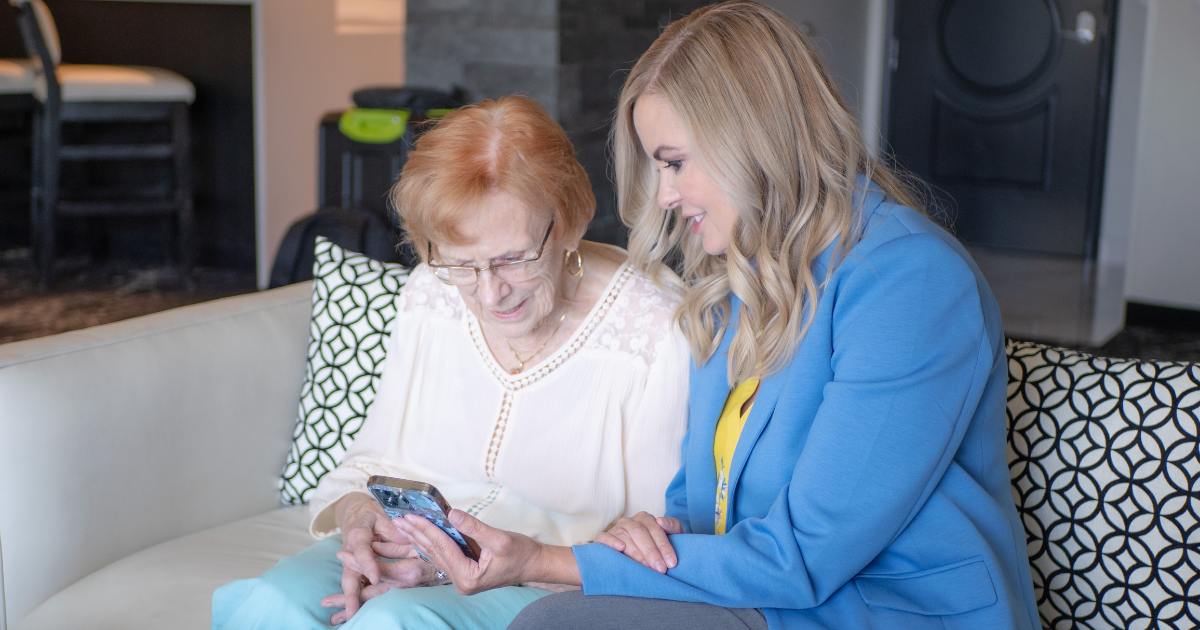In the later stages of life, social connections become increasingly vital for maintaining both mental and physical health. However, for many seniors, social isolation and loneliness can significantly diminish their overall well-being. As individuals age, various factors such as life transitions, physical limitations, and losing social connections may contribute to reduced social interactions. This isolation can lead to detrimental effects on mental and physical health, making it essential for seniors to foster friendships, especially with at home caregivers, to combat these challenges.
Recognizing Social Isolation among Seniors
Social isolation poses a significant threat to the well-being of seniors, and its impact manifests through various discernible signs and behaviors. These indicators include:
- Withdrawal from Activities: As individuals age, they might gradually withdraw from social gatherings, clubs, or events they once actively participated in. Seniors might opt out of these engagements due to mobility issues, transportation constraints, or a diminishing circle of friends. Such disengagement can result in reduced social interactions and a sense of disconnection from the world around them.
- Limited Social Contact: Spending extended periods alone becomes a norm for many seniors. They may find themselves confined within the walls of their homes, with minimal opportunities for social interaction. This isolation can be further exacerbated for those who live alone or have limited family visits or social engagements.
- Lack of Support: The absence of a reliable support system can deeply impact seniors. Without individuals to confide in or seek advice from, feelings of loneliness and helplessness intensify. At times, this lack of support might be due to the loss of a spouse, dwindling social circles, or physical limitations hindering interactions.
- Communication Gap: Seniors experiencing social isolation may rarely engage in communication through modern mediums like texting, phone calls, or video chats. Technological barriers or a lack of familiarity with these platforms can contribute to a growing disconnect from loved ones and friends.
- Absence of Meaningful Connections: The absence of close, intimate relationships can further contribute to isolation. Seniors may find themselves longing for deeper connections or friendships that offer genuine companionship and understanding.
- Emotional Responses: Social isolation can evoke a range of emotional responses, including lethargy, sadness, or a sense of rejection. Seniors might become hypersensitive to their environment, feeling easily overwhelmed or distressed by everyday stimuli due to the lack of regular human interaction and emotional support.
The presence of these manifestations of social isolation emphasizes the critical need for seniors to cultivate and maintain meaningful connections, especially with at home caregivers, to counteract the adverse effects on their mental and physical well-being.
Differentiating Social Isolation from Loneliness
Distinguishing between social isolation and loneliness is vital, particularly in understanding their distinct yet interconnected impacts on seniors’ mental and physical health. Social isolation primarily pertains to the objective aspect of reduced contact or interaction with others, where seniors may have limited opportunities for social engagement, leading to a lack of companionship and involvement in social activities. On the other hand, loneliness is a subjective emotional state, characterized by a profound sense of disconnection or feeling alone, irrespective of the physical presence of others. This emotional perception can persist even when seniors engage in social interactions, highlighting the complexity of loneliness beyond mere social interactions.
It’s important to recognize that seniors can experience loneliness despite being surrounded by people, illustrating the subjective nature of this emotional state. Both social isolation and loneliness, independently and collectively, significantly contribute to severe mental health issues among seniors, including depression, anxiety, cognitive decline, and various physical health complications. Addressing these challenges becomes paramount, emphasizing the need for fostering meaningful relationships and connections, particularly with at home caregivers, to counteract the detrimental effects of both isolation and loneliness on seniors’ well-being.
Mental Health Impacts of Social Isolation
The repercussions of social isolation on seniors’ mental health are profound and wide-ranging, encompassing various aspects that significantly impact their overall well-being. These effects include:
- Increased Substance Use: Seniors grappling with social isolation may turn to increased alcohol or substance use as a coping mechanism, seeking solace from feelings of loneliness and disconnection.
- Poor Physical Health: Isolation has a direct correlation with poorer physical health among seniors. The lack of social engagement often leads to a sedentary lifestyle, poor dietary habits, and a compromised immune system, consequently affecting their overall well-being.
- Higher Risk of Depression and Suicidal Thoughts: Seniors experiencing prolonged social isolation face an escalated risk of developing depression and even contemplating suicide due to the overwhelming sense of loneliness and despair.
- Brain Function Changes: Extended periods of isolation can lead to notable alterations in cognitive functions. Seniors may experience difficulties in memory retention, problem-solving, and overall mental agility.
- Antisocial Behavior: Prolonged isolation might encourage withdrawal and antisocial tendencies among seniors. They may exhibit behaviors characterized by avoiding social interactions, leading to a deeper sense of seclusion.
- Heart Disease and Heightened Stress: Isolated seniors are at a heightened risk of developing heart disease due to the cumulative effects of stress on the cardiovascular system. The emotional distress stemming from loneliness and isolation contributes to increased stress levels, which can have detrimental effects on heart health.
In mitigating these adverse effects, forming and maintaining meaningful relationships and connections, especially with at home caregivers, is crucial. These caregivers play a pivotal role in providing the necessary companionship, emotional support, and encouragement that are essential to alleviate the negative impact of social isolation on seniors’ mental and physical health.
Coping Strategies Supported by Caregivers for Social Isolation
At home caregivers hold a crucial position in aiding isolated seniors, particularly when addressing concerns regarding their physical and mental well-being. Their role involves implementing diverse coping strategies to mitigate the effects of social isolation. These strategies include:
- Professional Support: Encouraging and facilitating seniors to seek guidance and support from mental health professionals or therapists who specialize in geriatric care. This guidance can assist in managing feelings of loneliness and fostering better mental health.
- Social Engagement: Assisting seniors in finding and participating in social activities aligned with their interests, enabling them to engage with peers and build new connections. Caregivers can facilitate outings or arrange gatherings that promote social interactions.
- Caregiver Assistance: Actively engaging in conversation, providing continuous companionship, and encouraging various modes of communication, including verbal conversations, letters, or digital means. Caregivers serve as a constant source of emotional support and companionship.
- Support Groups or Senior Centers: Encouraging seniors to participate in support groups or activities offered by senior centers. These communities provide a sense of belonging, fostering social connections, and offering opportunities for shared experiences and camaraderie.
- Self-Care: Encouraging and supporting seniors in engaging in hobbies, exercises, and relaxation techniques as part of self-care routines. Caregivers can facilitate activities that promote physical health and mental well-being, such as walks, light exercises, meditation, or pursuing hobbies of interest.
By actively involving themselves in implementing these strategies, at home caregivers contribute significantly to the emotional and psychological upliftment of isolated seniors, thereby alleviating the adverse effects of social isolation on their overall health.
The Benefits of Friendship, Especially with At Home Caregivers
The significance of fostering friendships, especially with at home caregivers, remains unparalleled in the lives of isolated seniors. These relationships, whether with friends or caregivers, offer a multitude of benefits:
- Physical Health: Establishing friendships contributes to enhanced physical health and an overall sense of well-being among seniors. Engaging in social activities and companionship positively impacts their health outcomes.
- Healthy Behaviors: Friends, especially caregivers, often serve as encouragers, motivating seniors to adopt healthier habits like regular exercise routines and maintaining a balanced diet, promoting better physical health.
- Emotional Support: Friends, including caregivers, serve as a pillar of emotional strength during challenging times. They lend a listening ear, provide comfort, and offer reassurance, alleviating feelings of loneliness and isolation.
- Building Confidence: Supportive friendships boost seniors’ confidence and self-esteem. Friends encourage them to embrace their strengths, helping them feel valued and appreciated.
- Stress Relief: Spending quality time with friends serves as a natural stress-reliever, creating moments of relaxation and joy that counteract the negative effects of isolation-induced stress.
- Motivation and Improvement: Friends, including caregivers, act as a driving force, inspiring seniors to pursue their passions and interests. They motivate them to explore new hobbies, learn new skills, and strive for personal growth, fostering a sense of purpose and fulfillment.
These advantages underscore the indispensable role of friendships, particularly with at home caregivers, in enhancing the quality of life for isolated seniors, promoting both their physical and mental well-being. Investing in these relationships is pivotal in combating the adverse effects of social isolation and loneliness in their later years.
Conclusion
In conclusion, the profound effects of social isolation and loneliness on the mental and physical well-being of seniors cannot be overlooked. Fostering and nurturing friendships, particularly with empathetic caregivers, are integral in alleviating these challenges. With over 30 locations across Washington, Oregon, and Idaho, our caregivers in Boise, Idaho stand ready to offer personalized care, companionship, and various services. These caregivers are dedicated to combating social isolation, addressing mental health concerns, and establishing a unique bond of friendship with seniors. These relationships extend beyond mere physical assistance, providing invaluable emotional support, and cultivating a purposeful and gratifying life for seniors while receiving attentive care within the comfort of their own homes.
Sources:
6 Friendship Benefits: Why It’s Important to Stay Close to Your Friends






